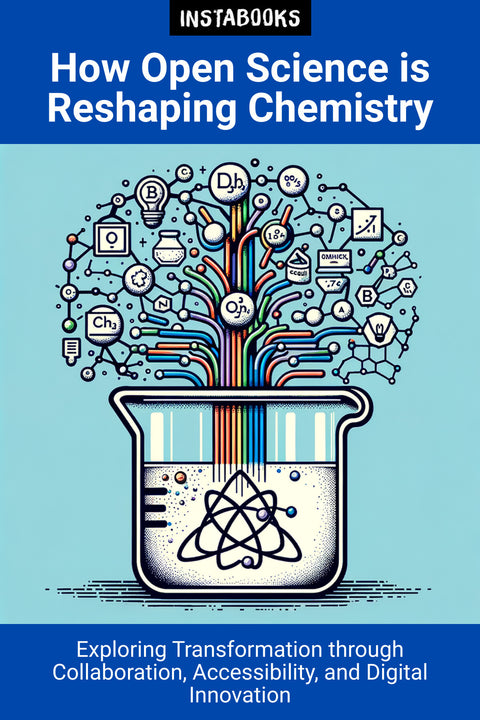
How Open Science is Reshaping Chemistry
Exploring Transformation through Collaboration, Accessibility, and Digital Innovation
Included:
✓ 200+ Page AI-Generated Book
✓ ePub eBook File — read on Kindle & Apple Books
✓ PDF Print File (Easy Printing)
✓ Word DOCX File (Easy Editing)
✓ Hi-Res Print-Ready Book Cover (No Logo Watermark)
✓ Full Commercial Use Rights — keep 100% of royalties
✓ Publish under your own Author Name
✓ Sell on Amazon KDP, IngramSpark, Lulu, Blurb & Gumroad to millions of readers worldwide
Discover the Revolution: Open Science in Chemistry
"How Open Science is Reshaping Chemistry" delves into the transformative impact of open science on the field of chemistry, highlighting the shift towards transparency, collaboration, and equitable access to research. This comprehensive guide offers an insightful exploration of the various ways open science is making waves in the world of chemistry, appealing to both seasoned researchers and enthusiastic learners.
Unveiling the Key Aspects of Open Science
From open access publications to the principles of FAIR (Findable, Accessible, Interoperable, Reusable) data sharing, this book presents a detailed examination of key concepts that are reshaping the chemical research landscape. With open access journals becoming more prevalent, this guide explains how data, when shared responsibly and collaboratively, can drive significant advancements in the field.
The Role of Preprints and Collaboration
Learn about the role of preprints in speeding up the dissemination of research findings and fostering early-stage collaborations. The book covers how online platforms are facilitating author self-archiving and increasing research visibility. Additionally, it emphasizes citizen science and collaborative infrastructures as pillars of innovation and creativity in chemistry.
Embracing Digitalization and Education
Digital tools and infrastructure are at the heart of the open science movement, making scientific practices more efficient and inclusive. This book outlines the role of national initiatives like the NFDI4Chem in Germany and explores the importance of education and training in equipping researchers with the skills needed to thrive in an open science environment.
A Roadmap for Future Research
Finally, "How Open Science is Reshaping Chemistry" offers a roadmap for researchers aiming to adopt open science principles in their work. Through case studies, practical examples, and expert insights, readers will gain the knowledge required to make their research more reproducible, verifiable, and beneficial to society. This book is a must-have for anyone keen on understanding and participating in the ongoing evolution of chemistry through open science.
Table of Contents
1. Introduction to Open Science in Chemistry- The Evolution of Research Practices
- Why Open Science Matters
- Pioneering Transparency and Collaboration
2. Open Access Publications
- Rising Influence of Open Journals
- Impact Factors and Quality
- Varied Open Access Licenses
3. FAIR Data Principles
- Understanding FAIR
- Challenges in Data Sharing
- Global Initiatives for Standardization
4. The Role of Preprints
- Accelerating Research Dissemination
- Platforms for Preprints
- Self-Archiving Controversies
5. Citizen Science Collaborations
- Engaging the Public
- Innovative Research Solutions
- Enhancing Creativity through Participation
6. Collaborative Infrastructures
- Discovery Platforms and Tools
- Facilitating Open Access Research
- Revolutionizing Knowledge Sharing
7. Digitalization in Chemistry
- The Rise of Digital Tools
- Electronic Lab Notebooks
- Infrastructure for Data Management
8. National Initiatives for Open Science
- Spotlight on Germany's NFDI4Chem
- A Model for Other Countries
- Supporting Researchers Globally
9. Education and Skills Development
- Training for Open Science
- Integrating Open Science in Curricula
- Building a Skilled Research Community
10. Ethical and Legal Considerations
- Addressing Privacy Concerns
- Legal Frameworks for Open Research
- Ensuring Ethical Standards
11. Challenges and Opportunities
- Overcoming Resistance to Change
- Opportunities for Advancement
- Future Prospects of Open Science
12. Conclusion: A New Era in Chemistry
- Summary of Key Insights
- The Ongoing Open Science Journey
- Envisioning the Future
Target Audience
This book is written for researchers, educators, and anyone interested in understanding the impact of open science on the field of chemistry.
Key Takeaways
- Understand the principles and benefits of open science in chemistry.
- Learn about open access journals and their influence on research quality.
- Explore the FAIR principles for data sharing and their application.
- Discover the role of preprints in accelerating research dissemination.
- Engage with citizen science and collaborative infrastructures.
- Examine the impact of digital tools and national initiatives like NFDI4Chem.
- Gain insights into the ethical, legal, and educational aspects of open science.
- Navigate the challenges and opportunities of embracing open science.
